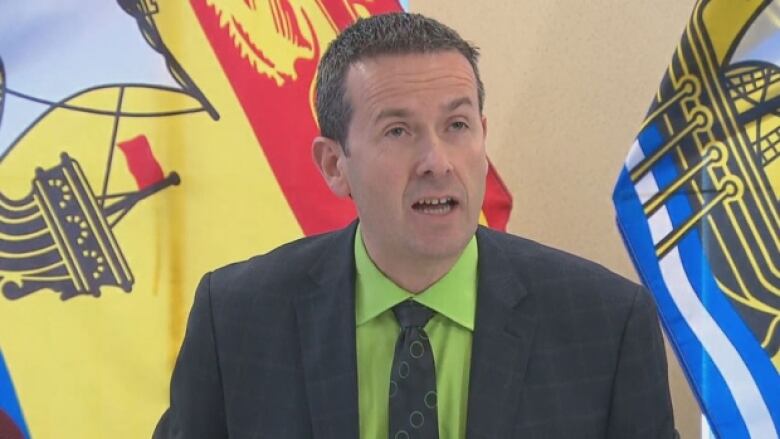Parlee Beach: What 2018 has in store for N.B.'s crown jewel of tourism

New Brunswickers can expect a lot of talk but not much action to fix the pollution problems plaguing Parlee Beach Provincial Park in 2018, according to at least one political expert.
"I think the provincial government will talk a lot about addressing the source of the problem because this is an election year," said Mario Levesque, political scientist at Mount Allison university.
"Whether they actually act on it — I don't think much will get done on the ground."
The province's working group is supposed to deliver a report in June 2018 — the fruit of months of studies it's conducting — with recommendations for government.
If we have the will, we can resolve this problem and return the beaches to consistently high water quality.- Douglas Campbell, biologist
But Levesque thinks it will take years before any of the concrete effects on water quality can be seen.
"It usually takes a decade or longer to fix something. And nobody likes to talk about that because it's not sexy," he said.
Levesque believes the discussion will inevitably have to shift toward land use planning in 2018, something the government has managed to avoid until now, despite pressure from environmental groups.
"The problem of excessive sewage is not going away, we're only going to be generating more," said Levesque.
Parlee Beach once again made headlines in 2017 for its fecal contamination problems, with the government publicly recognizing the extent of the decades-old problem for the first time.
Here's a look back.
January

CBC reveals staff at Parlee Beach under-reported days with poor water quality during the past summer season. There were 45 days when children and the elderly should have been advised not to swim, had the rules been followed.
The news comes after revelations the province already wasn't following federal guidelines and instead using a made in New Brunswick system which wasn't as rigorous. Health Minister Victor Boudreau denies staff ever failed to follow guidelines, and Premier Brian Gallant questions CBC's interest in the Parlee Beach file.
February

After an internal review, Environment Minister Serge Rousselle admits there was a "breakage" in the system that resulted in incorrect swimming conditions reported at Parlee Beach.
Rousselle says he can't explain how the mistakes happened. He thanks the media for flagging the problem and promises a new water monitoring regimen by the summer.
March

After months of controversy surrounding his involvement, Victor Boudreau recuses himself from the Parlee Beach file. Boudreau tells the CBC his decision came after hearing a moratorium on development was one of the options put on the table by the working group.
He held a stake in a controversial RV park project near the beach, and said he didn't want to be a "distraction" to government. Serge Rousselle officially becomes the government face of Parlee Beach.
April

The government announces staff at Parlee Beach will follow widely-used Canadian recreational water quality guidelines starting this summer, changes considered long overdue. It promises to replace old signs and test water more often.
May

The province announces up to $3 million will be invested to fund studies, as well as short-term fixes to mitigate the sources of contamination at Parlee Beach. These fixes include upgrading the pump-out stations at marinas and educating people about boating best practices.
June

The first hot weekend of the season is marked by a no swimming advisory at Parlee Beach. The advisory is issued after heavy rainfall amounts lead to concerns about potential high bacteria levels in the water. Still, some visitors don't heed the warning.
July

Frustrations grow from both cottagers and business owners, who say government is falling behind on its promise to mitigate some of the sources of contamination in the short-term.
A protest in the streets of Shediac attracts hundreds, meanwhile business owners say they have yet to see the money promised by government put to use, and are deeply worried about tourism.
As Parlee sees a few more no-swimming advisories in July, more people reportedly head for neighbouring Aboiteau Beach.
August

After staying silent on much of the public debate, the mayor of Shediac is the latest to add his voice to the mounting frustration over lack of action at Parlee Beach.
Jacques LeBlanc says the public needs to see immediate steps taken to improve water quality to maintain confidence. Meanwhile residents complain about the smell of sewage at the beach.
September

As the season draws to a close, the province reveals visitor numbers were down 26 per cent at Parlee Beach this year. High fecal bacteria counts continue into the fall.
Meanwhile, Victor Boudreau steps down as health minister. He tells reporters "I don't have any regrets," as he addresses being dropped from cabinet. After 25 years in politics, he says he is leaving willingly.
October, November & December

The working group continues water sampling and studying sources of contamination in preparation for the 2018 report.
Government begins construction on projects to improve water quality at Parlee Beach, such as wastewater infrastructure improvements in Shediac.
Meanwhile, at a news conference on tourism numbers, Tourism Minister John Ames talks of a "PR dilemma" when it comes to wanting to promote Parlee Beach, while being conscious of the effect of poor water quality on health and safety.

Biologist Douglas Campbell, who is involved in some of the working group's studies, says data compiled indicates episodic spikes of contamination, rather than a systemic problem, and believes the issue is fixable.
"If we have the will, we can resolve this problem and return the beaches to consistently high water quality. This is not a problem of persistent contamination, it can be cleaned up," said Campbell.

